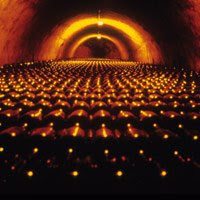LOGORHYTHMIC

For Horia Cornean
I want to say to you: “all theorems are trivial, even when they seem colossal.” You will quote in turn that witty fellow of Guy Davenport: “every force evolves a form.” What else is there to do, then, other than drink to that? And stuff ourselves with goat meat in ginger and turmeric. Lick our fingers afterwards, get our noses sprayed by Pol Roger, and then turn to fresh raspberries. I then see color in the black hole, and you can also swear that you see a light. Right then and there. We’re ready for a cult. Our empire of the senses. A black hole has no information, so if we want to get something out of it, we had better start believing. We then go over to Taittinger and then and hence start philosophizing on identity and relationships. Then I want to say to you: “linking identity is the sum of divergence and entropy,” but then I know that you will quote me: “cut the crap.” So then I say instead: “Kafka was a vegetarian. And then he thought success is the biggest disappointment.” My reflection in the mirror is searching for the power function of this inverted logarithm. Who wants who to come? Oh, I so do. I do. Then you will. You will.


Comments
For me a theorem is just a path which goes from A to B. The longer, the more sinuous, the harder to find your way through the labyrinth, the greater is my pleasure. I don't care much about the relevance, or importance, or beauty of A and B. The hunt is important. The kill.
And I am a goddamn dangerous hitman. So beware, don't let me prove something in your neighborhood :)
This equates the action of proof with an operation of obviousness which transform any given mystery into a well established, universally accepted, boring truth. Just stitch together a theorem leading there, anywhere, true or false. Then no one will even bother to check whether a theorem is true or not. Why should one challenge the obvious?
Edmond Jabès: The Book of Shares (1989)